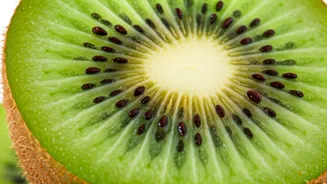Allergy or Reaction?
Sometimes, the trouble stems not from the fruit itself, but from an allergic reaction or an intolerance to it. These reactions can trigger various gut
issues, and among them, constipation might be noticeable. Although, allergic reactions aren't always to blame for digestive concerns. It's essential to pinpoint the root cause when dealing with any gut problems. Consulting a healthcare professional can help you diagnose and treat such problems effectively. If you regularly experience digestive discomfort after eating kiwis, consider evaluating whether it's an allergy or a sensitivity that is causing it.
Fiber's Role in Digestion
Kiwi fruits contain a considerable amount of dietary fiber, which, while generally beneficial for digestion, can sometimes have unexpected effects. Fiber helps to add bulk to the stool, and that is beneficial. However, in some individuals, especially those who do not consume adequate water, excessive fiber intake can actually worsen constipation. This is because the fiber absorbs water in the digestive tract, potentially leading to hard, dry stools that are difficult to pass. This is why hydration plays such an important role in how your body responds to the fiber found in kiwis. Finding the right balance of fiber and water can greatly influence your digestive health.
Proper Hydration's Importance
The amount of water you drink can dramatically affect your digestive health, and it's a critical factor when consuming kiwis. When you are dehydrated, your body will absorb water from the colon, making stools drier and harder. This can lead to constipation. Kiwi fruits, being rich in fiber, require enough water to facilitate smooth passage through the digestive system. Therefore, consuming kiwis without enough water can exacerbate constipation issues. Ensuring you drink sufficient water throughout the day, especially when you are eating fiber-rich foods like kiwis, can help to prevent or alleviate constipation. Staying hydrated is always an essential factor for proper digestive function.
FODMAPs and the Gut
Kiwi fruits contain certain types of carbohydrates, such as fructans, that are classified as FODMAPs (Fermentable Oligosaccharides, Disaccharides, Monosaccharides, And Polyols). These are sugars that are not well absorbed in the small intestine, and some people may experience digestive problems when consuming them, including bloating and constipation. While kiwi fruits are generally considered low in FODMAPs, the levels can still trigger issues in sensitive individuals. Those with conditions like Irritable Bowel Syndrome (IBS) should pay close attention to how their body reacts to kiwis, and consider portion control or consulting with a healthcare professional to adjust their diet accordingly.
Actinidin's Influence
Kiwi fruit contains an enzyme called actinidin. It helps break down proteins and can influence the way your digestive system works. While actinidin can support digestion by aiding in the breakdown of proteins, it can also have side effects for some individuals. For sensitive people, it might irritate the gut. This can lead to changes in bowel habits, which might include constipation in certain cases. The exact impact of actinidin varies from person to person. It is critical to take note of how your body responds to kiwi fruit consumption and adjust accordingly, possibly by altering portion size or frequency of consumption to help manage your digestive health.
Portion Control Strategies
The amount of kiwis you eat can significantly influence your digestive health, especially if you're prone to constipation. Eating too many kiwis can overload your system with fiber and potentially worsen constipation. It is beneficial to moderate your intake. A good starting point is to limit your portions to one or two kiwis per day. This allows you to enjoy the benefits of this nutritious fruit without overloading your digestive system. Pay attention to how your body responds and adjust your portion size as needed. If you notice any digestive discomfort, decreasing your portion or increasing your water intake might offer relief.
Digestive Paradox Explained
The paradoxical effects of kiwi fruit on digestion often perplex people. Kiwi fruits are usually praised for their high fiber content and are thus regarded as a remedy for constipation. However, as discussed, certain factors can actually cause or worsen constipation in some individuals. This is often due to a combination of factors, including fiber content, the level of hydration, and the presence of FODMAPs and actinidin. The way kiwi fruit affects your digestion depends on your unique physiology, health status, and other dietary factors. It is essential to be aware of all these aspects to understand the potential link between kiwis and constipation.















